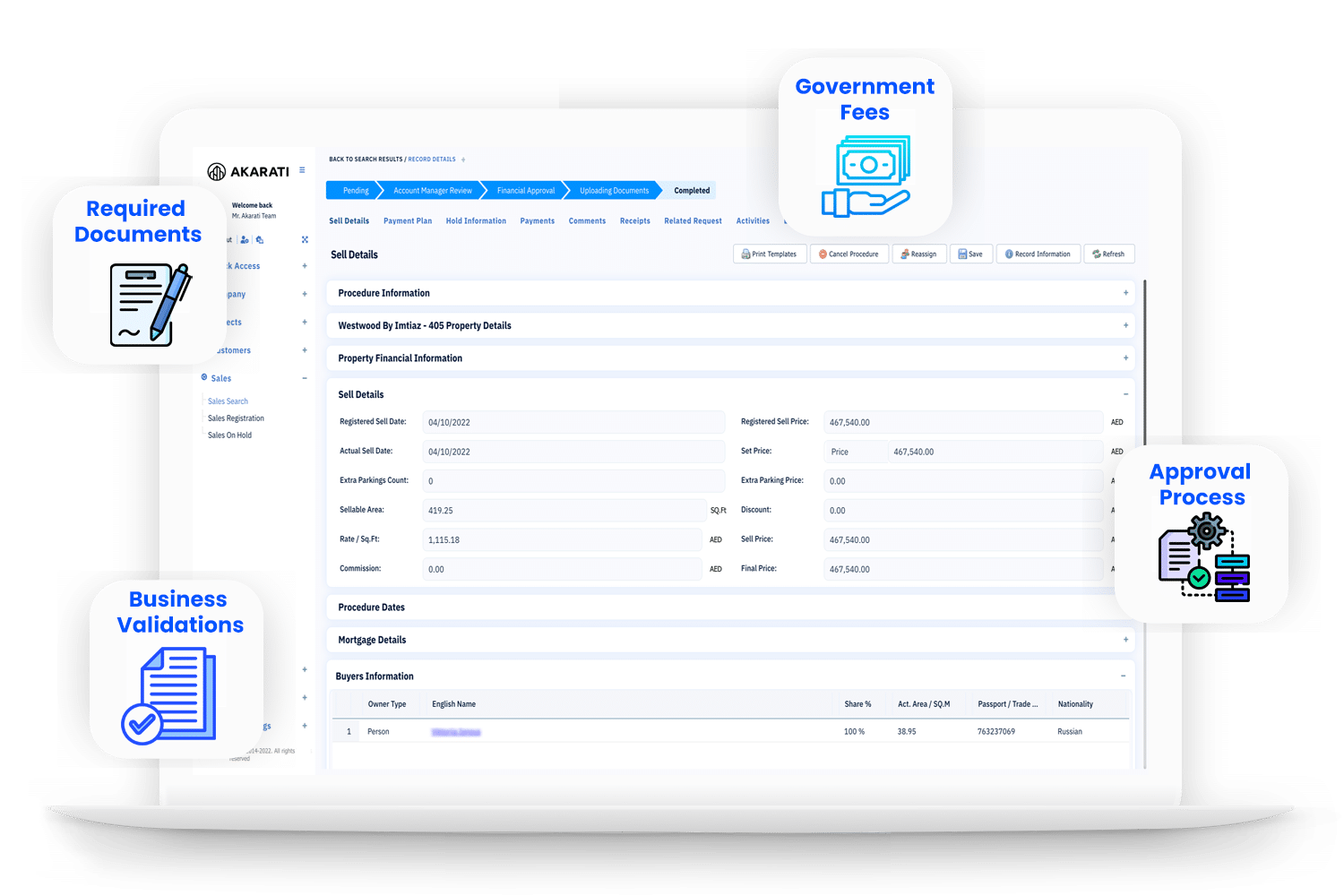10 Ways to Empower Real Estate through Data
Driven Success

Discover 10 Ways to Empower Real Estate through Data -Driven Success. From streamlining operations to enhancing data management and improving customer relationships, explore how Akarati revolutionizes real estate businesses. Maximize efficiency, optimize property portfolios, and drive growth with the transformative capabilities of Akarati ERP. Unlock the full potential of your real estate business and achieve unparalleled data success in today’s competitive market.
1-Data Success with Akarati ERP
2-Akarati ERP for Real Estate
3-Driving Data Success with Akarati ERP
4-Data Empowerment for Real Estate
5-Akarati ERP: Enhancing Real Estate
6-Data-Driven Success: Akarati ERP for Real Estate
7-Akarati ERP: Empowering Real Estate Businesses
8-Streamlining Operations with Akarati ERP Software
9-Enhancing Data Management for Real Estate Professionals
10-Improving Customer Relationship Management and Collaboration
The real estate industry is undergoing rapid transformation, compelling businesses to seek innovative methods to enhance their operations and drive efficiency. One transformative tool that is revolutionizing how real estate companies manage their processes is Akarati ERP software solution. In this article, we will delve into the ways in which Akarati empowers real estate businesses, enriches efficiency, and drives data driven success. Through streamlining operations, enhancing data management, and improving customer relationship management and collaboration, Akarati is transforming the real estate industry.

Data-Driven Streamlining: Enhance Real Estate Collaboration with Akarati ERP
In today’s fast-paced and highly competitive business environment, organizations across various industries are constantly seeking ways to optimize their operations and gain a competitive edge. One powerful solution that has emerged to address these challenges is Enterprise Resource Planning (ERP) software. Among the leading ERP providers is Akarati, whose comprehensive ERP system offers businesses an array of tools and features to streamline their operations and enhance overall efficiency.
Akarati ERP is designed to integrate key business functions and processes into a unified platform, providing organizations with real-time visibility and control over their entire operations. With modules covering areas such as finance, human resources, supply chain management, customer relationship management, and more, Akarati ERP offers a holistic approach to managing the complexities of modern business operations.
One of the primary benefits of implementing Akarati ERP is the consolidation of data and processes. Traditionally, businesses relied on multiple software systems, spreadsheets, and manual processes to manage various aspects of their operations. This fragmented approach often led to data silos, inefficiencies, and errors. Akarati ERP replaces this fragmented landscape with a centralized system that connects all departments and functions, enabling seamless data flow and fostering collaboration across the organization.
Akarati ERP’s finance module provides organizations with a comprehensive suite of tools to manage their financial operations effectively. From accounts payable and receivable to budgeting, asset management, and financial reporting, the finance module streamlines financial processes, improves accuracy, and enables better decision-making. With real-time access to financial data and automated workflows, businesses can reduce the time and effort spent on manual tasks and focus on strategic financial planning.
The human resources module of Akarati ERP simplifies and automates various HR processes, including recruitment, employee onboarding, payroll management, performance evaluation, and training. By centralizing HR data and automating routine tasks, organizations can improve efficiency, reduce administrative overhead, and enhance employee satisfaction. The self-service functionality empowers employees to access and update their own information, reducing the HR department’s workload and enabling them to focus on strategic HR initiatives.
Another notable feature of Akarati ERP is its robust supply chain management capabilities. The supply chain module covers procurement, inventory management, demand forecasting, and logistics, among others. By providing end-to-end visibility into the supply chain, businesses can optimize inventory levels, minimize stockouts, and streamline procurement processes. With accurate demand forecasting and automated replenishment, organizations can ensure timely delivery of products or services to their customers, improving customer satisfaction and loyalty.
Akarati ERP’s customer relationship management (CRM) module helps businesses effectively manage their customer interactions and enhance customer satisfaction. By consolidating customer data, sales information, and service requests, organizations can gain valuable insights into customer behavior and preferences. This knowledge allows businesses to personalize their marketing efforts, deliver targeted sales campaigns, and provide superior customer service. The CRM module also enables seamless collaboration between sales, marketing, and customer service teams, fostering a customer-centric approach across the organization.
In addition to its powerful features, Akarati ERP offers scalability and flexibility, making it suitable for businesses of all sizes and industries. The system can be customized to meet specific organizational requirements, ensuring a tailored solution that aligns with the unique needs and workflows of each business. With cloud-based deployment options, businesses can leverage the benefits of Akarati ERP without the need for extensive IT infrastructure, reducing costs and increasing accessibility.
Enhancing Data Management for Real Estate Professionals
In the real estate industry, efficient data management is crucial for success. Real estate professionals deal with vast amounts of information, ranging from property listings and market trends to client details and transaction records. To effectively manage and leverage this data, real estate professionals are turning to advanced tools and technologies. By enhancing data management practices, professionals can gain valuable insights, streamline processes, and ultimately drive better business outcomes.
One of the primary challenges in real estate data management is the sheer volume of information that needs to be collected, organized, and analyzed. With numerous properties, clients, and transactions to track, manual data management becomes time-consuming and prone to errors. To overcome these challenges, real estate professionals are adopting innovative solutions such as Customer Relationship Management (CRM) software.
CRM systems designed specifically for real estate professionals provide a centralized database to store and manage client information, property details, and communication history. These systems offer features like contact management, lead tracking, task automation, and email integration, allowing professionals to streamline their workflows and stay organized. By leveraging a CRM, real estate professionals can effectively manage their client relationships, track leads, and access crucial property information with ease.
Another key aspect of data management in real estate is market analysis and trend tracking. Staying up to date with market conditions, pricing trends, and property values is essential for making informed decisions. Real estate professionals are increasingly relying on market data platforms that aggregate and analyze market information from various sources. These platforms provide comprehensive insights into market trends, property values, and competitor analysis, empowering professionals to make data-driven decisions regarding pricing, property acquisition, and marketing strategies.
Data visualization tools also play a vital role in enhancing data management for real estate professionals. These tools enable professionals to transform complex data sets into visual representations such as charts, graphs, and maps. With visualizations, professionals can quickly grasp and communicate insights, identify patterns, and present information in a compelling manner. Visualizations are particularly useful when analyzing property data, comparing market trends, and creating impactful marketing materials.
Data security is a paramount concern in the real estate industry, given the sensitive nature of client information and financial transactions. Real estate professionals must prioritize data security and adopt robust measures to protect against cyber threats and data breaches. Implementing secure cloud-based storage solutions, using encryption techniques, and regularly updating security protocols are essential steps for safeguarding data integrity and maintaining client trust.
Furthermore, integrating data management systems with other real estate tools and technologies can significantly enhance efficiency and productivity. For instance, integrating a CRM with online listing platforms enables real estate professionals to automatically synchronize property listings, streamline lead generation, and manage inquiries efficiently. Integration with accounting software simplifies financial management, tracking expenses, and generating accurate reports.
As real estate professionals increasingly rely on mobile devices for their day-to-day operations, mobile applications tailored for data management offer added convenience and flexibility. Mobile apps allow professionals to access and update client information, manage appointments, and collaborate with colleagues on the go. With mobile solutions, real estate professionals can stay connected, respond promptly to client needs, and stay productive, regardless of their physical location.
Improving Customer Relationship Management and Collaboration
In today’s highly competitive business landscape, building strong customer relationships and fostering effective collaboration within organizations are crucial for long-term success. To achieve these goals, businesses are increasingly turning to advanced Customer Relationship Management (CRM) tools and collaboration platforms. By improving customer relationship management and facilitating collaboration, businesses can enhance customer satisfaction, drive productivity, and foster innovation.
Customer Relationship Management (CRM) systems provide businesses with a centralized platform to manage and nurture their customer relationships. These tools enable businesses to store and organize customer data, track interactions, and analyze customer behavior. By leveraging CRM systems, businesses can gain a comprehensive understanding of their customers, allowing for personalized and targeted marketing efforts.
CRM systems offer a wide range of features to improve customer relationship management. These features include contact management, lead tracking, opportunity management, sales forecasting, and customer service ticketing. By streamlining these processes, businesses can effectively manage their customer interactions, ensure timely follow-ups, and provide exceptional customer service. CRM systems also provide real-time insights and analytics, enabling businesses to make data-driven decisions and identify opportunities for growth.
Effective collaboration within an organization is equally important for driving success. Collaboration platforms and tools enable teams to communicate, share information, and work together seamlessly. These platforms eliminate communication silos, promote transparency, and facilitate knowledge sharing. By fostering collaboration, businesses can harness the collective expertise of their teams, leading to innovative solutions and improved decision-making.
Collaboration platforms offer a wide range of features to enhance teamwork and productivity. These features include document sharing, task management, real-time messaging, video conferencing, and project tracking. With these tools, teams can collaborate on projects, share ideas, and exchange feedback in a centralized and accessible environment. Collaboration platforms also enable remote work and facilitate virtual team collaboration, allowing businesses to adapt to changing work dynamics and leverage global talent.
Integrating CRM systems with collaboration platforms can significantly enhance customer relationship management and collaboration within organizations. By combining these tools, businesses can ensure that customer data and interactions seamlessly flow between the CRM system and collaboration platform. This integration allows sales and customer service teams to access customer information, track sales activities, and collaborate effectively on customer-related tasks. It also enables teams to collaborate on marketing campaigns, share customer insights, and align their efforts towards achieving common goals.
Additionally, CRM and collaboration integration empowers businesses to gain a holistic view of their customer relationships. Sales and customer service teams can leverage collaboration platforms to share customer feedback, highlight potential upsell opportunities, and collaborate on resolving customer issues promptly. Marketing teams can collaborate with sales and customer service to develop targeted campaigns based on customer insights. The integration of CRM and collaboration platforms promotes cross-functional collaboration, breaking down departmental barriers and fostering a customer-centric approach across the organization.
we give this opportunity to ride the smart real estate enterprises through Akarati, by taking the first step and book you free demo from here!
Welcome to our news letters
Akarati is One ERP platform to replace them all.
subscribe to our newsletters to know how all of your work can be done in one place.
.
